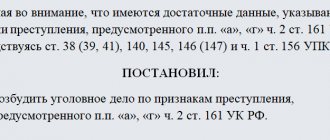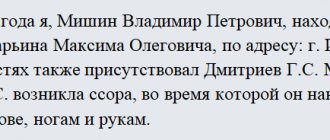When can you appeal a criminal case?
Like any other procedures in criminal proceedings, the initiation of a case must be carried out in strict accordance with the requirements of the law - the Code of Criminal Procedure and other rules. And if at least one element is violated, it becomes possible to appeal the decision to initiate a criminal case and cancel it, thereby avoiding bringing the case to court and possible unpleasant consequences. However, for an effective appeal, one of the following situations must occur:
- there were obstacles to initiating a criminal case - there are a number of restrictions on opening a case, including the expiration of statutes of limitations, amnesty for the accused, insufficient age for criminal liability, etc., which directly prohibit initiating criminal proceedings. If the case is open, the decision can be successfully appealed;
- the established procedure for initiating criminal proceedings was not followed - the entire pre-trial investigation procedure, including the decision to open a case, must be carried out in strict accordance with current legislation. Recorded deviations and violations are grounds for appeal against the initiation of a case;
- lack of corpus delicti or insufficient justification - a criminal case must be initiated on the basis of a proven fact of an offense and evidence obtained legally. If the investigation does not have enough such evidence, the accused can appeal the initiation of the case.
In addition to the above, the basis may be the incompetence of law enforcement officers who opened the case, personal hostility, conflict of interest, etc. - in a word, any circumstances that can be interpreted in favor of the accused. Therefore, the participation of a lawyer before the initiation of a criminal case is very important - he will be able to select a suitable basis for an appeal.
Participants in the stage of initiating a criminal case
Criminal procedural legislation in Chapter. 5–8 of the Code of Criminal Procedure of the Russian Federation identifies participants in criminal proceedings, giving them the appropriate legal status. However, the circle of persons involved in the initiation of a criminal case may be much wider. Depending on the legal status and the place that these persons occupy in the stage under consideration, they can be conditionally classified into two groups. The first group should include persons involved in criminal proceedings in connection with filing an application or report of a crime committed, being committed or being prepared:
- applicant;
- a person who has suffered from a crime;
- a representative of the person affected by the crime;
- a person against whom an investigation is being carried out based on a statement or report of a crime;
- a person who has turned himself in (turned himself in);
- a person who knows any circumstances that need to be clarified;
- the person who detained the one who committed the crime;
- an eyewitness to the incident;
- witness;
- specialist;
- expert;
- translator.
The second group should include officials and government bodies who are granted by law the right to verify statements and reports of crimes and, depending on the presence or absence of signs of a crime, make an appropriate procedural decision. This applies to the body of inquiry, the inquiry officer and the investigator, who, in accordance with the principle of publicity (Part 2 of Article 21 of the Code of Criminal Procedure of the Russian Federation) are obliged to carry out criminal prosecution by initiating a criminal case of public and private-public accusations. The law includes the head of the investigative body and the head of the investigation unit in this category of persons.
The prosecutor is also an active participant in this stage. Thus, the prosecutor’s decision to send the relevant materials to the preliminary investigation body to resolve the issue of criminal prosecution may be a reason to initiate a criminal case (clause 4, part 1, article 140 of the Code of Criminal Procedure of the Russian Federation). A copy of the resolution of the head of the investigative body, investigator, or inquiry officer to initiate a criminal case is immediately sent to the prosecutor (Part 4 of Article 146 of the Code of Criminal Procedure of the Russian Federation).
The investigator must obtain the consent of the prosecutor to initiate a criminal case for the crime specified in Part 4 of Art. 20 Code of Criminal Procedure of the Russian Federation. In addition, having recognized the decision of the body of inquiry, the interrogator on the refusal to initiate a criminal case as illegal or unfounded, the prosecutor cancels it and sends the corresponding resolution to the head of the body of inquiry with his instructions, setting a deadline for their execution. Having recognized the refusal of the head of the investigative body, the investigator to initiate a criminal case as illegal or unfounded, the prosecutor, no later than 5 days from the receipt of the materials for verifying the crime report, cancels the decision to refuse to initiate a criminal case, about which he issues a reasoned resolution outlining the specific circumstances subject to additional verification, which, together with the specified materials, is immediately sent to the head of the investigative body (Part 6 of Article 148 of the Code of Criminal Procedure of the Russian Federation).
It should be noted that the law did not give the court the right to make decisions on the application and report of a crime at the stage of initiating a criminal case. An exception should be considered the right of a magistrate to accept a statement of crime into proceedings in a criminal case of private prosecution (part 2 of article 20, part 1 of article 318 of the Code of Criminal Procedure of the Russian Federation). Although this procedure cannot be called a “classical” version of initiating a criminal case, in fact, the acceptance of an application for proceedings by a magistrate “opens” criminal procedural activity and is similar to the initiation of a criminal case.
Where to go to appeal a criminal case?
One of the main questions that worries people in such situations is: where to go to appeal the initiation of a criminal case? After all, a complaint to higher authorities does not look very reliable: most likely, management will not want to understand the actions of their subordinates, and the decision will remain in force. According to the Criminal Procedure Code, a person against whom a criminal case has been initiated has two options - extrajudicial and judicial appeal. Let's take a closer look at each of the options.
Is it possible to appeal the initiation of a criminal case without going to court? Yes, of course, there is such an opportunity, but you won’t have to communicate with the investigator or his superiors. To do this, you need to file a complaint with the prosecutor at the place where the case was opened. However, it is also possible to file a complaint with the head of the investigative agency, but the likelihood of its satisfaction is very low. The prosecutor must respond to the complaint within 3 days (in some cases, if additional action is required, up to 10 days), and if the argument is convincing, the decision may be in favor of the accused.
However, in practice, out-of-court appeal is used quite rarely as it is ineffective, and it is better to immediately go to court. It is also possible to go to court after receiving a refusal from the prosecutor or the head of the investigative body. A complaint is filed with the court of general jurisdiction at the place of registration of the accused. The appeal must be considered by the court no later than 5 days after receiving the complaint. The exact time is communicated when filing an application at the court office.
Grounds for initiating a criminal case
Lawyer Antonov A.P.
The Code of Criminal Procedure of the Russian Federation provides for two forms of initiating a criminal case. The first, most often encountered, is a procedural decision on the availability of sufficient data at the disposal of the investigator (interrogating officer, etc.) indicating signs of the objective side of the crime, and provided for in Art. Art. 140 - 143 of the Code of Criminal Procedure of the Russian Federation, the source of such. This decision must be formalized by a resolution to initiate criminal proceedings.
The second form of initiating a criminal case is provided for some private prosecution cases. However, it is not mentioned in Chapter 20 of the Code of Criminal Procedure of the Russian Federation, which means that it has no relation to the provisions enshrined in paragraph 1 of Part 1 of Art. 46 of the Code of Criminal Procedure of the Russian Federation. For this reason alone we cannot agree with I.L.’s statement. Petrukhin, according to which a suspect is any person against whom a criminal case of private prosecution has been initiated.
When does the moment come to initiate a criminal case in the manner established by Chapter 20 of the Code of Criminal Procedure of the Russian Federation? And, accordingly, from what point in the criminal process does the suspect appear in this case? There can be one answer to the questions posed: after the decision to initiate a criminal case is duly formalized and signed by a competent official (body), or, otherwise, from the moment the decision to initiate a criminal case is signed by the investigator (inquirer, etc.). As a general rule, from now on, if a criminal case is initiated against a specific person, the specified person is given the legal status of a suspect.
A criminal case must be initiated “on the grounds and in the manner established by Chapter 20 of this Code.” “This Code” here means the Code of Criminal Procedure of the Russian Federation.
The legal concept of the grounds for initiating a criminal case, which are discussed in paragraph 1 of Part 1 of Art. 46 of the Code of Criminal Procedure of the Russian Federation, defined in Part 2 of Art. 140 Code of Criminal Procedure of the Russian Federation. Here, in particular, it is said that “the basis for initiating a criminal case is the presence of sufficient data indicating signs of a crime.”
To get a more complete understanding of this concept, you should decide on the answers to two questions:
- what signs are we talking about here;
- What does “sufficient data” mean?
Signs of a crime are a criminal law concept used in two meanings: the concept of formative signs of a crime and signs of a crime. Is it consistent to use the term “evidence of a crime” without any additional reservations in criminal proceedings to characterize the factual grounds for initiating a criminal case? I think not, for two reasons. Firstly, speaking in general about the signs of a crime, proceduralists force the law enforcement officer to think that the initiation of a criminal case is possible only if there is one (the presence of all the signs of a crime). Secondly, the lack of specification of what elements of a crime are being discussed leads to the inherently absurd conclusion that sufficient data on any elements of a crime is the actual basis for initiating a criminal case.
Neither the signs of the subject, nor the signs of the subjective side of the crime, in isolation from the signs of the objective side of the crime, have any significance for deciding the issue of initiating a criminal case. The task of establishing the subject and the subjective side of the crime faces the next stage after the initiation of a criminal case - the stage of preliminary investigation. Only after investigative actions have been carried out is it permissible to talk about any degree of proof of a person’s guilt in committing a crime. It is unacceptable to identify the person who committed the crime by means of preliminary verification of statements and reports of a crime.
Accordingly, we can conclude that in Part 2 of Art. 140 of the Code of Criminal Procedure of the Russian Federation, the grounds for initiating a criminal case are understood as sufficient data at the disposal of the competent authority indicating procedurally significant signs of the objective side of the crime. This position, regarding the grounds for initiating a criminal case, is shared by the majority of proceduralists.
Meanwhile, it is necessary to pay special attention to the fact that we are not talking about all the signs of the objective side of the crime. Only the presence of information from the preliminary investigation authorities about the signs of a socially dangerous act and signs of socially dangerous consequences of its commission can become the reason for the emergence of one or another criminal procedural legal relationship that we are analyzing.
Now a few words about what is meant by the term “sufficient data”. The data becomes sufficient after the body competent to initiate a criminal case has such a set of materials (evidence) at its disposal that it generates reliable knowledge about the indisputable presence of a set of criminally procedurally significant signs of the objective side of the crime, which makes it possible to make a decision to initiate a criminal case. Usually, sufficient data appears as a result of a preliminary verification of the statement (report) of a crime, but sometimes they can be contained directly in the reason for starting the criminal process (the reason for initiating a criminal case).
As a general rule, the investigator (investigator, etc.) has the right to independently make a decision to initiate a criminal case. There is only one exception to this. In the absence of a statement from the victim (his legal representative) in cases of private-public prosecution in the event of a crime being committed against a person who cannot defend his rights and legitimate interests, the investigator (inquiry body, head of the inquiry unit, head of the inquiry body, leader or member of the group investigators) have the right to initiate a criminal case only with the consent of the prosecutor. Such a criminal case can also be initiated against a specific person.
Everything is clear with the general order. The decision to initiate a criminal case against a specific person is made (the resolution is drawn up) by the investigator himself (inquiry officer, etc.). As soon as such a resolution is signed by him, a suspect appears in the criminal process.
The situation when a criminal case can be initiated only with the consent of the prosecutor is not so simple. At what point in the criminal process will the suspect appear in this case: when did the investigator (head of the inquiry unit, etc.) put his signature on the resolution, or when did the prosecutor give consent (certify it with his own signature)? Or, in other words, who initiates such a criminal case: the investigator who makes a decision, or the prosecutor who gives consent to this? In order to give a correct answer to the question posed that corresponds to the letter of the law, you should do a small analysis of the content of Part 4 of Art. 147 Code of Criminal Procedure of the Russian Federation.
In Part 4 of Art. 147 of the Code of Criminal Procedure of the Russian Federation states that the investigator initiates a criminal case. It does not say here that the investigator petitions the prosecutor to make an appropriate decision, as is the case with the procedure for making some other criminal procedural decisions (for example, with the adoption of a decision to extend the period of inquiry, where a corresponding petition is filed with the prosecutor). In other words, the wording of this part of Art. 147 of the Code of Criminal Procedure of the Russian Federation allows us to conclude that the decision to initiate a criminal case is made not by the person giving consent, but by the investigator (the head of the investigation unit, etc.).
In order for a person to become a suspect according to the rules provided for in paragraph 1 of Part 1 of Art. 46 of the Code of Criminal Procedure of the Russian Federation, the procedure for initiating criminal cases established by Chapter 20 of the Code of Criminal Procedure of the Russian Federation must be observed.
This order is enshrined in Art. Art. 146 and 147 of the Code of Criminal Procedure of the Russian Federation. This understanding of this phrase is suggested by the interpretation of the concepts “order” and “established”. Order is the rules by which something happens (by which it should happen, be done). The verb “establish” means to determine, appoint, approve, put into effect. To establish means to make a mandatory rule.
Mandatory rules of procedure for initiating criminal cases of public prosecution are enshrined in Art. 146 of the Code of Criminal Procedure of the Russian Federation, and the same kind of rules concerning cases of private-public prosecution - in Art. 147 Code of Criminal Procedure of the Russian Federation.
In relation to the procedure for initiating criminal cases of public prosecution, we are talking about the following rules:
1) to initiate a criminal case, it is necessary to have the provisions provided for in Art. 140 of the Code of Criminal Procedure of the Russian Federation reasons and grounds;
2) the decision to initiate a criminal case is made by the investigator (inquiry officer, etc.);
3) it is mandatory to comply with the provisions of Parts 2 and 3 of Art. 146 of the Code of Criminal Procedure of the Russian Federation, the procedural form of the decision to initiate a criminal case.
The procedure for initiating criminal cases of private-public and private prosecution by an investigator (inquiry officer, etc.) is less regulated by the criminal procedure law. Nevertheless, it seems that all of the above basic rules for initiating criminal cases of public prosecution are also applicable to the procedure for initiating criminal cases of private-public and private prosecution by an investigator (inquiry officer, etc.). The only difference between these procedures is that cases of private-public and private prosecution, as a general rule, are initiated only at the request of the victim (the legal representative of the victim, and in the event of the death of the victim, at the request of his close relative). Without such a complaint, the investigator (the head of the investigative body, the head or a member of the investigative team) has the right to initiate a criminal case of private-public or private prosecution only if the crime of which they became aware was committed against a person who cannot defend his rights and legitimate interests (due to a dependent or helpless state or for other reasons). And the investigator (the head of the investigation unit, etc.) is allowed to initiate criminal cases of this kind, but only with the consent of the prosecutor.
Sincerely, lawyer Anatoly Antonov, managing partner of the law firm Antonov and Partners.
Still have questions for your lawyer?
Ask them right now here, or call us by phone in Moscow +7 (499) 288-34-32 or in Samara +7 (846) 212-99-71 (24 hours a day), or come to our office for a consultation (by pre-registration)!
Tatyana Moskalkova again proposed abandoning the stage of initiating a criminal case
According to the FPA press service, on December 6, the Federation Council hosted a round table of the Committee on Constitutional Legislation and State Building to discuss guarantees for the implementation of the victim’s right to access to justice when deciding to initiate a criminal case. The initiator of the round table was the Commissioner for Human Rights in the Russian Federation, Tatyana Moskalkova.
At the beginning of the event, Deputy Chairman of the Committee Alexander Karlin, who moderated the discussion, noted that the Constitution of the Russian Federation, guaranteeing everyone judicial protection of their rights and freedoms, as one of its essential elements establishes the right to appeal to the court decisions and actions of public authorities and their officials persons, and also determines that the state provides victims with access to justice and compensation for damage caused.
These constitutional provisions are consistent with the UN Declaration of Basic Principles of Justice for Victims of Crime and Abuse of Power, which enshrines the right of persons who have suffered harm as a result of a criminal act to have access to justice mechanisms and prompt redress for harm suffered, and the duty of UN Member States to help ensure that judicial and administrative procedures were more responsive to the protection of victims of crime by providing them with an opportunity to present their case and have their views and wishes considered at appropriate stages of the proceedings where their personal interests were affected, without prejudice to the accused and in accordance with the relevant national criminal system justice.
Tatyana Moskalkova began her speech with a reference to the statement of the famous Russian legal scholar Ivan Foinitsky that the criminal process begins with the victim. She noted that, among other things, the functions of the state are to protect citizens from criminal attacks, compensation for damage and moral satisfaction that “the offender is punished.” However, as the Ombudsman noted, there is currently a growing trend in complaints from victims about what they consider to be illegal procedural decisions. At the same time, she recalled that once upon a time, neglect in criminal proceedings towards the figure of the victim became one of the factors in solving these problems outside the criminal procedural procedure established by law, which led to the growth of lynchings.
The Commissioner for Human Rights reported that most of the requests she receives on this issue concern the illegal refusal to initiate a criminal case. Thus, in one of the cases, decisions to refuse to initiate criminal prosecution with further cancellation by the prosecutor were made 23 times. Also, according to Tatyana Moskalkova, problems continue to be red tape and long investigation times, and the investigative body’s disregard for the procedural figure of the victim, who often does not have information about the progress of the criminal case and the decisions made on it. Facts of refusal to register reports of a crime have still not been eliminated, despite the fact that some time ago the Russian Ministry of Internal Affairs substantively dealt with this problem and was able to significantly change the negative trend, but this problem has not been completely resolved.






